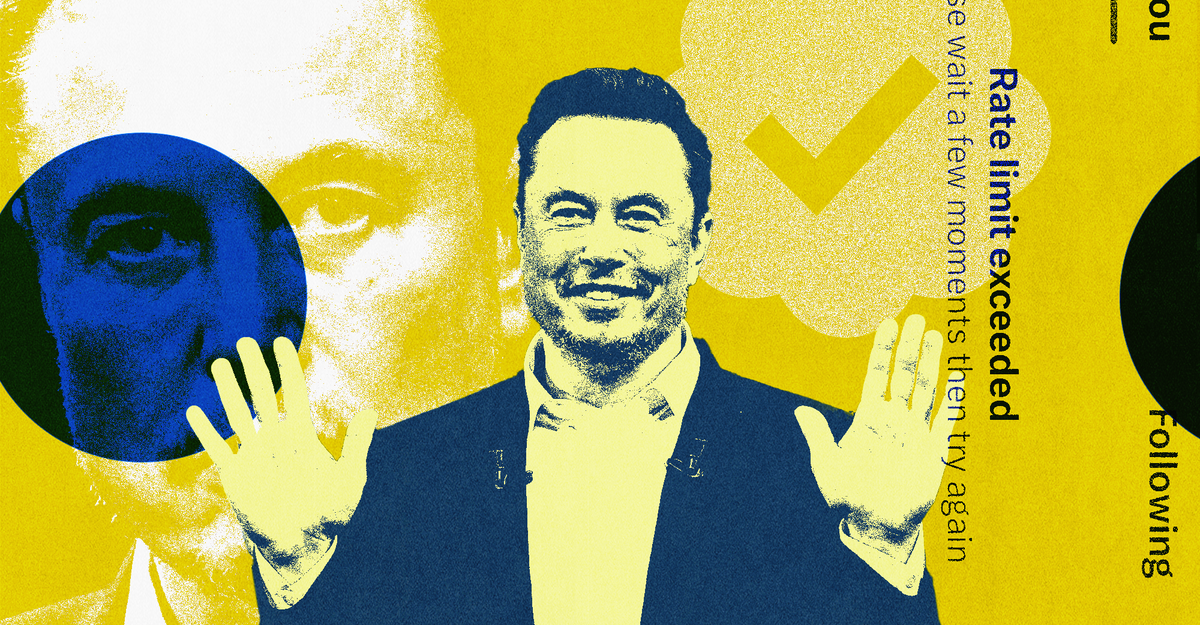Stop using the platform, if you insist on continuing to use it, you deserve the shit show you are getting. End of story.
The whole fiasco motivated me to create mastodon account. The crazy thing is that I never used Twitter.
Also I don’t get why people are complaining that mastodon is difficult. It seems to me is quite simple, or am I missing something?
They probably struggle to follow accounts from different instances, but it’s really not any harder than an email address.
It’s not necessarily so easy, there aren’t substitutes for a lot of the communities on twitter. Though I did just get into Bluesky the other day and am already spending more time in there than on twitter.
Mastodon has been working really well for me once I followed people. Connect well with Lemmy as well which I like. Hopefully more “official” accounts come in.
I’ve been in Mastodon for a few months and Bluesky for a few days, and Bluesky just blows it out of the water as a twitter replacement. Easier technically, a lot more of the people I follow are on there, people are easier to find, and most importantly the algorithm encourages rather than discourages engagement.
I find there’s no “discouraging”. Rather it’s just posts. The “engagement” aspect of Twitter and modern social media is imo the one thing that’s most important to leave behind. It’s not healthy.
Been using Mastodon since 2018 and it’s brutally frustrating waiting for people to move to it.
It’s a really stable platform, and the various instance communities are pretty great.
But I have no fuckin clue why it’s not growing in adoption by Internet Normans.
Although, after the rate limiting issue, a whole shitload of people have signed up, so it’s promising.
Normies hate that Linuxy feel. I’m not hugely fond of the bare metal feel of federated social networks myself, and I’ve been doing the computer thing for… uh, when was the VIC-20 released again? Don’t underestimate the persuasive power of a friendly interface.
It was the social-media equivalent of Costco implementing a 10-items-or-fewer rule, or a 24-hour diner closing at 7 p.m.—a baffling, antithetical business decision for a platform that depends on engaging users (and showing them ads) as much as possible.
I stopped reading shortly after this, because the rest was paywalled…
The extreme, even illogical nature of these interventions led to some speculation: Is Twitter’s so-called rate limit a technical mistake that’s being passed off as an executive decision? Or is it the opposite: a daring gambit of 13-dimensional chess, whereby Musk is trying to plunge the company into bankruptcy and restructuring? The situation has made conspiracy theorists out of onlookers who can’t help but wonder whether Musk’s plan has been to slowly and steadily destroy the platform all along.
Such theories are compelling, but they all share a flaw, in that they presuppose both a rational actor and a plan. You may not find either here.
That last line sums up what many have thought is actually going on at twitter, tesla, et al. for a while.
I saw a post a few months ago (which I’m too lazy to find) where a former SpaceX employee explained how the managers had to manipulate Musk into not destroying the company. Essentially as the company grew, they formed a metaphorical cyst around his influence to limit his damage. That didn’t exist when he infested Twitter, and so the internet’s dumpster was ignited.
It really makes you wonder if all the “billionaires” aren’t exactly like this. Born into infinite privilege, surrounded by yes men and sycophants every minute of their lives. They become walking disasters who have to be managed and distracted constantly, kept far away from the actual business.
In the last few years, we’ve gotten an up close and personal look at two such figures - Musk and Trump. Musk is increasingly being revealed to be an idiot on at least a weekly basis. Trump is about to face his 3rd round of indictments out of who knows how many are coming? Putting a spotlight on these people has not gone well for them, to say the least.
I wonder what would happen if a camera crew had near-constant access to Jamie Dimon, Jeff Bezos, etc. I wonder if they have teams positioned around them to screen them out of important decisions as much as possible, because the privilege created by their disgusting levels of wealth and power has rotted their brains. I also wonder if you were to look closely enough at their dealings, they wouldn’t all be under indictment.
It really makes you wonder if all the “billionaires” aren’t exactly like this. Born into infinite privilege, surrounded by yes men and sycophants every minute of their lives. They become walking disasters who have to be managed and distracted constantly, kept far away from the actual business.
This instantly reminded me of Succession on HBO. It felt so over the top when it first came out but the more I learn about the ultra wealthy the more believable the show becomes.
Plus it seems to be based on the owners of Fox News.
Humans naturally conflate wealth with either high intelligence or impeccable morality. In religious circles, this is often the source of prosperity gospel. In economic circles, this is often the source of fraud.
Plain Text:
Twitter may have just had its worst weekend ever, technically speaking. In response to a series of server emergencies, Elon Musk, the Twitter owner and self-professed free-speech “absolutist,” decided to limit how many tweets people can view, and how they can view them. This was not your average fail whale. It was the social-media equivalent of Costco implementing a 10-items-or-fewer rule, or a 24-hour diner closing at 7 p.m.—a baffling, antithetical business decision for a platform that depends on engaging users (and showing them ads) as much as possible. It costs $44 billion to buy yourself a digital town square. Breaking it, however, is free.
First, Twitter set a policy requiring that web users log in to view tweets—immediately limiting the potential audience for any given post to people who have Twitter—and later, Musk announced limits to how many tweets users can consume in a day, purportedly to counter “extreme levels of data scraping & system manipulation.” Although these measures will supposedly be reversed, as others have been during Musk’s tenure, they amount to a sledgehammering of a platform that’s been quietly wasting away for months: Twitter is now literally unusable if you don’t have an account, or if you do have an account and access it a lot. It is the clearest sign yet that Musk does not have his platform under control—that he cannot deliver a consistently functional experience for what was once one of the most vibrant and important social networks on the planet.
The extreme, even illogical nature of these interventions led to some speculation: Is Twitter’s so-called rate limit a technical mistake that’s being passed off as an executive decision? Or is it the opposite: a daring gambit of 13-dimensional chess, whereby Musk is trying to plunge the company into bankruptcy and restructuring? The situation has made conspiracy theorists out of onlookers who can’t help but wonder whether Musk’s plan has been to slowly and steadily destroy the platform all along.
Such theories are compelling, but they all share a flaw, in that they presuppose both a rational actor and a plan. You may not find either here. I’ve reported on Musk for the past five years, speaking with dozens of employees in the process to try to understand his rationales. The takeaway is clear: His motivations are frequently not what they seem, and chaos is a given. His money and power command attention and his actions have far-reaching consequences, but his behavior is rarely befitting of his station.
Of course, many of his acolytes—especially those in Silicon Valley—have tended to believe that he has everything in hand. “It’s remarkable how many people who’ve never run any kind of company think they know how to run a tech company better than someone who’s run Tesla and SpaceX,” the investor Paul Graham tweeted in November, after Musk took over the social network. “In both those companies, people die if the software doesn’t work right. Do you really think he’s not up to managing a social network?” But it has been clear since the moment we got a glimpse into his phone that Musk’s purchase of Twitter was defined by impulse: It appears to have been triggered in part by getting his feelings hurt by the company’s previous CEO. The decision was rash enough that he tried three times to back out of it.
Musk’s management style at the platform has appeared equally unstrategic. After saddling the company with a mountain of debt to complete his acquisition in October, he decided to tweet baseless conspiracy theories and alienate advertisers; days before this incident, the marketing lead in charge of managing Twitter’s brand partnerships had resigned. Musk quickly unbanned Twitter’s most egregious rule breakers; fired most of the employees, including those in charge of technical duties; and bungled the rollout of Twitter’s paid-verification system. Compared with a year earlier, Twitter’s U.S. advertising revenue for the five weeks beginning April 1 was down 59 percent.
Recently, Musk’s public-facing strategy to turn his company around has been to continue tweeting thinly veiled conspiracy theories and sex jokes, cozy up to far-right politicians, hire a CEO who was initially contractually forbidden to negotiate with some of Twitter’s brand partners, and float fighting Mark Zuckerberg in a cage match. To date, Musk’s leadership has degraded the reliability of Twitter’s service, filled the platform with bigots and spam, and alienated many of its power users. But this weekend’s disasters are different. The decision to limit people’s ability to consume content on the platform is the rapid unscheduled disassembly of the never-ending, real-time feed of information that makes Twitter Twitter.
His supporters are confused and, perhaps, starting to feel the cracks of cognitive dissonance. “Surely someone who can figure out how to build spaceships can figure out how to distinguish scrapers from legit users,” Graham—the same one who supported Musk in November—tweeted on Saturday. What reasonable answer could there be for an advertising company to drastically limit the time that potentially hundreds of millions of users can spend on its website? (Maybe this one: On Saturday, outside developers appeared to discover an unfixed bug in Twitter’s web app that was flooding the network’s own servers with self-requests, to the point that the platform couldn’t function—a problem likely compounded by Twitter’s skeleton crew of engineers. When I reached out for clarification, the company auto-responded with an email containing a poop emoji.)
All the money and trolling can’t hide what’s obvious to anyone who’s been paying attention to his Twitter tenure: Elon Musk is bad at this. His incompetence should unravel his image as a visionary, one whose ambitions extend as far as colonizing Mars. This reputation as a genius, more than his billions, is Musk’s real fortune; it masks the impetuousness he demonstrates so frequently on Twitter. But Musk has spent this currency recklessly. Who in their right mind would explore space with a man who can’t keep a website running?
Thanks for pasting that out.
Of course, many of his acolytes—especially those in Silicon Valley—have tended to believe that he has everything in hand.
One thing I’ve learned recently is how braindead much of the Silicon Valley venture capital community actually is. It wasn’t just that they all put their money in one bank that collapsed when they all pulled out. A major act of stupidity in itself. It is that they consistently have very little idea how business works in general. They seem to be living in an insulated bubble, and only survive because other people dump billions of dollars into their laps. No one checks up on them nor verify whether any of their startups are actually viable. It’s just more and more money dumped into their laps with most of it wasted.
Eventually, the cash spigot will end, and my bet is nearly all of them will forced out of the industry. Collectively, they have done nothing but waste hundreds of billions of other people’s money. Even their few “success” stories are examples like companies that got bought out with few of them ever making money, or companies that could only survive if the venture capital market was crazy strong. So even those are flops if we’re honest. So the whole thing seems destined to fail in a spectacular way.








